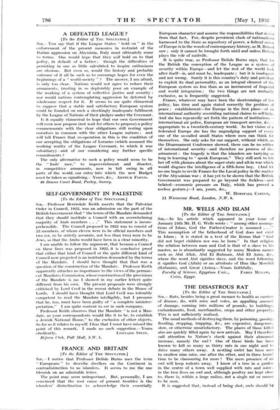SELF-GOVERNMENT IN PALESTINE
[To the Editor of TI1E SPECTATOR.] SIR,—Professor Berriedale Keith asserts that the Palestine Order in Council, 1922, was an admission on the part of the British Government that " the terms of the Mandate demanded that they should institute a Council with an overwhelming majority of Arab members . . ." This statement is incom- prehensible. The Council proposed in 1922 was to consist of 23 members, of whom eleven were to be official members and two (or, to be strictly accurate, not less than two) were to be Jews, so that the Arabs would have been in a clear minority.
I am unable to follow the argument, that because a Council on these lines was proposed in 1922, it is conclusive proof that either that kind of Council or the quite different kind of Council now projected is an institution demanded by the terms of the Mandate. I should have thought that that was a question of the construction of the Mandate. Professor Keith apparently attaches no importance to the views of the perman- ent Mandates Commission, whose construction of the provisions of the Mandate is (as I showed in my earlier letter) quite different from his own. The present proposals were strongly criticised by Lord Cecil in the recent debate in the House of Lords. I should have thought that Lord Cecil was tolerably competent to read the Mandate intelligibly, but I presume t hat he, too, must have been guilty of " a complete misinter- pretation." I am quite content to err in such company.
Professor Keith observes that the Mandate " is not a Man- date, as your correspondents would like it to be, to establish a Jewish National Home," to the exclusion of other objects. So far as it relates to myself, I fear that I must have missed the point of this remark. I made no such suggestion.—Yours obediently, LEONARD STEIN. Reform Club, Pall Mall, S.W. 1.














































 Previous page
Previous page